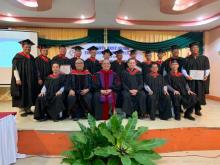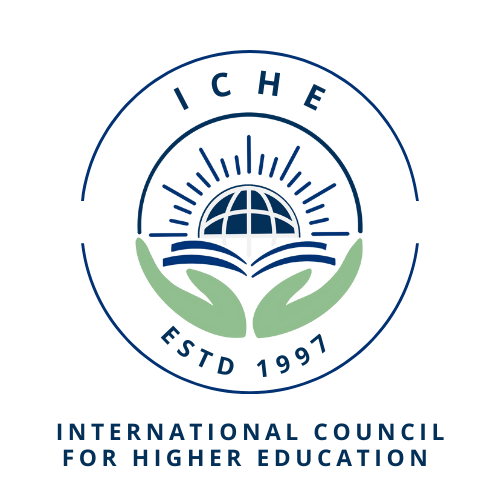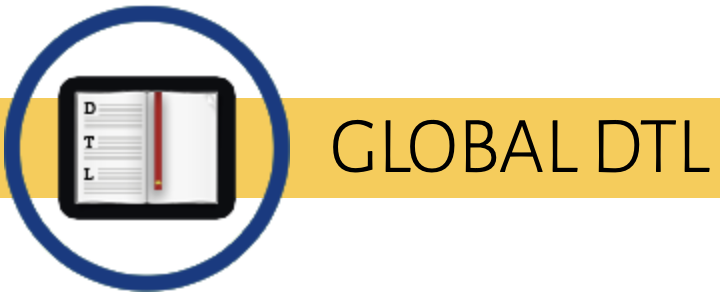South East Asian Theological Schools, Inc. DMin 303 Missional Ecclesiology: Frameworks for Functional Churches in Society
Michael J. Fast, Ph.D. 6 Units [9 hours online class]
Classes will be held in August 3, 5, 7, 17, 19, & 21 2020, 8:00-9:30AM Manila Time (6:00-7:30PM Saskatoon Time)
Purpose:
The SEATS D.Min. Program’s goal is to develop leaders who are able to translate the Christian faith into local Asian contexts so that the deep cultural artifacts that exist in these contexts can also be impacted by the Good News of Jesus Christ. One key aspect to that is the church. Many of the church forms currently in use in Asia are imported from other contexts and often poorly contextualized into South East Asian contexts. One good way of looking at the church is by examining its functions, or the roles it fills in society. Another good way of looking at the church is whether its primary focus is gathered or scattered. This course is crucial for your future life and ministry because it will help you examine these two aspects of the church with the goal of helping you develop functional churches in your context.
The advent of COVID-19 and its related restrictions brings us to a new age for the church – one where human interaction and contact is limited. This class will emphasize the church scattered and how functionality can be developed.
This page will serve as a communication tool from me to you as we journey together in this class!
Learning Outcomes:
By the end of this Course you should have demonstrated growth in the following areas:
1. A continually developing set of biblical attitudes based on Jeremiah 29 (engagement under less than ideal situations), John 3:17 (non-condemnational), and Mark 1:1 (gospel as political statement).
2. A greater grasp of how the functions of the church as more important than the forms of the church, including changing the scorecard from bums in seats to functionality
3. An ability to identify deep cultural artifacts and connect the gospel to them, and how to identify and develop relationships with other parts of the fabric of society to further God’s kingdom.
4. The ability to take practical steps in doing theology in your context, including evaluating the times, dealing with opposing opinions and viewpoints, evaluating truth claims, learning when to adopt, when to adapt, and when to convert.
5. A deeper love for not only the church but for the world (in the sense that God loves the world too).
Learning Tasks (Assignments):
1. Your first learning task is to read through the set learning tasks given below (1 hour). You will be provided with a “contract” in which you affirm that you have read carefully through the learning tasks and commit yourself to completing them. As the purpose of the learning tasks is for you to provide evidence that you have made measurable progress towards the learning outcomes, I encourage your creativity and ownership by suggesting alternative tasks that better suit your learning style. However, your suggested task(s) must involve a comparable amount of out-of-class effort and must serve the learning outcomes. If you are interested in designing an alternative learning task or tasks, I encourage you to speak with me, and I will assist you in the process.
2. You will be expected to prepare for class, including watching videos in advance, to attend the Zoom sessions, and to participate in discussions, debates and case- study reflections, as directed. 10% of course assessment.
3. You will be required to record a series of five (5) VLogs on the functions of the church. The VLogs should should be 10 minutes in length include at least the following:
a. One Vlog will be an overview of the theology of the Functional Church and the other four Vlogs will each cover one of the four functions of the church.
b. A brief summary of some of the key issues raised in the reading or class session. Strong feelings – either positive or negative – that were elicited by the material, with a brief statement as to the possible source of these feelings.
Response to the question “If this is true, so what?” – the practical implications of the key issues in ministry and life.
VLogs might also include such things as prayers, sermon outlines and hymns, in response to the readings and lectures.
c. The purpose of this learning task is to observe the impact the course materials and activities are having on shaping your own personal understanding of how the church can engage society. 40% of course assessment.
4. Teach a class on functional church to your group. This includes the following components:
a. Preparing an outline for the class.
b. Making the PPT presentation. Please don’t simply copy the PPTs from this class
c. Teaching the class to at least 5 students.
d. Submitting a narrative report of how the class went including the date the class was held, the name of the teacher, the names of the students, and any results or feedback from the class. 50% of course assessment.
Learning Activities:
As time permits, we will seek to investigate some or all of the following:
• Foundations of our faith, including a look at three key passages.
• The church & its mission.
• Kerygma, or Making Good News Good, including other non-Western emphases of the gospel.
• Koinonia, or Building Kingdom Values.
• Marturia, or Truth telling.
• Diakonia, or Service.
• Preaching and teaching.
• Foundations to ministry.
• Structural Evil.
• Theology of money.
• Theology of Disaster
As appropriate, class sessions will include some or all of the following:
• Personal testimonies, in which students will seek to connect great doctrines to their own
• spiritual experiences
• Small-group discussion of key issues through analytic, synthetic and evaluative questions
• Reflection on case studies in light of key theological issues
• Movie clips and theological reflection
Learning Resources: (See Professor for Copies)
Functional Church-related Resources:
Aagaard, J. (1965). Some main trends in modern protestant missiology. Studia theologica, 19(1-2), 238-259. doi: 10.1080/00393386508599878
Bosch, D. J. (2011). Transforming mission: Paradigm shifts in theology of mission (No. 16). Orbis books. Chapter 12.
Cogswell, J. A. (1987). Relief and Development: Challenges to Mission Today. International Bulletin of Missionary Research, 11(2), 72-76. doi: 10.1177/239693938701100206
Conradie, E. M. (2011). The church and the environment: seven stations towards the sanctification of the whole earth: church and environment. Scriptura: Journal for Contextual Hermeneutics in Southern Africa, 107(1), 156-170. Retrieved from https://journals.co.za/content/script/107/1/EJC119896?crawler=true&mimet...
Fackre, G. (1979). Ministries of Identity and Vitality. Theology Today, 36(3), 375-382. Retrieved from doi: 10.1177/004057367903600308
Groome, T. H. (1999). The Purposes of Christian Catechesis. In Groome, T. H., & Corso, M. J., Eds. Empowering Catechetical Leaders. National Catholic Educational Association, 1077 30th Street, NW, Suite 100, Washington, DC 20007-3852. Retrieved from https://files.eric.ed.gov/fulltext/ED430318.pdf
Hancke, F., & Verster, P. (2013). Comprehensive personal witness: a model to enlarge missional involvement of the local church. Missionalia, 41(3), 270-289. doi: 10/7832/41-3-39
Hortop, K. H. (1980). The church as family: a study of viability in the smaller local Seventh-day Adventist church. Retrieved from https://digitalcommons.andrews.edu/cgi/viewcontent.cgi?article=1611&cont...
Nel, M. (2009). Congregational analysis: A theological and ministerial approach. HTS Teologiese Studies/Theological Studies, 65(1). Retrieved from https://www.ajol.info/index.php/hts/article/view/56714/45133
Oden, T. C. (1980). Recovering lost identity. Journal of Pastoral Care, 34(1), 4-19. Retrieved from doi: 10.1177/002234098003400102
Pachuau, L., & Jorgensen, K. (2011). Witnessing to Christ in a Pluralistic World Christian Mission among Other Faiths. Retrieved from https://scholar.csl.edu/cgi/viewcontent.cgi?article=1024&context=edinbur...
Poulton, J. (1978). The Church as People. Churchman, 92(3), 219-224. Retrieved from http://biblicalstudies.gospelstudies.org.uk/pdf/churchman/092-03_219.pdf
Strengholt, J. M. (2008). Gospel in the air: 50 Years of Christian witness through radio in the Arab world. Boekencentrum. Retrieved from https://dspace.library.uu.nl/bitstream/handle/1874/27062/strengholt.pdf?...
Van der Ven, J. A. (1988). Practical theology: from applied to empirical theology. Journal of empirical theology, 1(1), 7-27. doi: 10.1163/157092588X00023
Van Niekerk, A. (2014). The missional congregation in the South African context. HTS Theological Studies, 70(1), 01-06. doi: doi:10.4102/hts.v70i1.2648
Verster, P. (2014). Missiology: Rise, demise and future at the university. Dutch Reformed Theological Journal= Nederduitse Gereformeerde Teologiese Tydskrif, 55(3_4), 879-893. Retrieved from https://uc.reformedjournals.co.za/ngtt/article/view/453/845
Watson, D. L. (1983). Evangelism: A disciplinary approach. International Bulletin of Missionary Research, 7(1), 6-9. Retrieved from doi: 10.1177/239693938300700102
Contextualization and Enculturation Resources:
Bulatao, J. (1965). Split-level Christianity. Philippine Sociological Review, 13(2), 119-121.
Bulatao, J. C. (1992). Split-Level Christianity. In Phenomena and Their Interpretation: Landmark Essays, 1957-1989 (pp. 22–31). Ateneo de Manila University Press.
de Mesa, J. M. (1988). Re-Thinking the Faith with Indigenous Categories. Inter-Religio 13, 18-29.
de Mesa, J.M. (2012). Inculturation as pilgrimage. Mission and Culture: The Louis J. Luzbetak Lectures, 5-34.
Enriquez, V. G. (1994). Pagbabangong-dangal: Indigenous psychology and cultural empowerment. Quezon City: Akademya ng Kultura at Sikolohiyang Pilipino.
Hill, G. J. (2017). Salt, light and a city (second edition): Ecclesiology for the global missional community: Volume 1, Western voices. Wipf and Stock Publishers.
Hill, G. J. (2015). GlobalChurch: reshaping our conversations, renewing our mission, revitalizing our churches. InterVarsity Press.
Maggay, M. P. (2005). Engaging Culture: Lessons from the Underside of History. Missiology 33(62), pp. 62-70. doi:10.1177/009182960503300106
Maggay, M. P. (2013). A religion of guilt encounters a religion of power: Missiological implications and consequences. In M. P. Maggay (Ed.), The gospel in culture: Contextualization through Asian eyes. Manila: OMF Literature Inc.
Maggay, M. (2018). Contextualization Social Science, Scripture and the Holy Spirit in the Interpretive Task. Paper presented at the 2018 Asia Theological Association Theological Consultation: Responding to the call: Interdisciplinary approaches to doing theology in Asia, Mandaluyong, Metro Manila, Philippines, July 31 – August 2, 2018.
Vatican II Council. (1964). Dogmatic constitution on the church: Lumen gentium. Solemnly promulgated by his Holiness Pope Paul VI on November 21, 1964. Retrieved from https://www.vatican.va/archive/hist_councils/ii_vatican_council/document...
Vatican II Council. (1965). Decree on the mission activity of the church: Ad gentes. Solemnly promulgated by His Holiness Pope Paul VI on December 7, 1965. Retrieved from http://www.vatican.va/archive/hist_councils/ii_vatican_council/documents...
Walls, A. F. (1988). The Translation Principle in Christian History. In Stine, P. C. (Ed.). Bible translation and the spread of the church: The last 200 years. Leiden: E.J. Brill.
Walls, A. F. (1996). The Gospel as Prisoner and Liberator of Culture. In The missionary movement in Christian history: Studies in the transmission of faith. Maryknoll: Orbis books, pp. 3-15.
Walls, A. F. (2002). The Ephesian moment. In The cross-cultural process in Christian history: Studies in the transmission and appropriation of faith. Maryknoll: Orbis Books, pp. 72- 81.
Walls, A. F. (2004). Converts or proselytes? The crisis over conversion in the early church. International Bulletin of Missionary Research, 28(1), pp. 2-6. doi:10.1177/239693930402800101
Websites & Blogs:
There are a lot of web-based resources on missional ecclesiology, some older and some newer. The following list was derived from Tyndale’s Missional Church Online Reading Room (https://www.tyndale.ca/seminary/inministry/reading-rooms/missional-church). It contains mostly Western, male personalities. For a list of Female Asian theologians, please see Hill & Kim’s 18 Asian Female Theologians You Should Know About (Plus Others For You To Explore). Retrieved from https://theglobalchurchproject.com/18-asian- female-theologians/ (Version 9: January 14, 2019).
Anabaptist Mennonite Network. After-Christendom Series. Retrieved from https://amnetwork.uk/resource_type/after-christendom/
Common Ground Journal: Perspectives on the Church in the 21st Century. Retrieved from https://www.edcot.com/cmngrnd/index.html
DeVries, D. Missional Challenge: Aligning Every Believer with the Redemptive Mission of Jesus! Retrieved from https://missionalchallenge.com
Ekklesia Project. Publications. Retrieved from http://www.ekklesiaproject.org/
Forge Canada. Voices from the Missional Movement. Retrieved from https://www.forgecanada.ca/resources
Franke, J. R., Guder, D. L., Hunsberger, G., Barrett, L., Brownson, J., Sundermeier, T., Tizon, A., and Creasy, K. Dean. The Gospel and Our Culture Network. Retrieved from https://gocn.org
Frost, M. Mike Frost: author, speaker, missiologist, agitator. Retrieved from http://mikefrost.net/blog
Jones, A. Tall Skinny Kiwi: Religious Conversations. Retrieved from https://tallskinnykiwi.typepad.com
Hill, G. J. Global Church Project: Exploring the wisdom and theologies of World Christianity with Graham Joseph Hill. Retrieved from https://theglobalchurchproject.com
Meigs, R. (2006-2017) Friend of Missional. Retrieved from http://friendofmissional.org/ and http://theblindbeggar.org
Sherman, S., and Weston, P. (2017). Newbigin Resources. Retrieved from https://newbiginresources.org
Stetzer, Ed. MG Blog: Ed Stetzer and Mission Group Blog. Retrieved from https://edstetzer.com/blog/
Brisco, B. Missional Church Network: Helping to activate all the people of God. Retrieved from http://missionalchurchnetwork.com/
Woodward, JR. Missional Church: A Primer. Retrieved from http://jrwoodward.net/2008/11/a-primer-on-todays-missional-church/
Mutual Commitments:
Because this class is a D.Min. class, the primary responsibilities lie on you, the student, in learning. This class is also conducted in a modular format, which means that many of the activities will need to be done by you outside of class. Having said that, I am fully committed to helping you on your journey towards being a the minister of the gospel that you would like to be! Here is what I am expecting from you and what you can expect from me as we journey together.
What I expect from you as an emerging leader in the service of Christ:
1. I expect you to be diligent in preparing thoroughly for each session.
2. I expect you to submit work on time, or, if this is not possible, to request an extension adequately in advance of the deadline.
3. I expect you to participate fully and constructively in all course activities and discussions.
4. I expect you to show respect towards other students, being sensitive to national, cultural, gender and other individual differences, and listening courteously when others speak in class.
5. I expect you to provide accurate and constructive feedback on the course content and methodology that will help me as I teach this course and when I teach this material again in the future.
My commitments to you are:
1. I will prepare carefully for each class session.
2. I will encourage reciprocity and cooperation among you as a class of emerging leaders.
3. I will emphasize time on task, making the best use of the available time to promote quality learning.
4. I will promote active learning, respecting diverse talents and learning styles.
5. I will provide adequate opportunity outside of the class session times for you to discuss the course material with me.
6. I will do my best to provide prompt feedback on your work.
Online Class Requirements:
Because this in an online class, students will have some extra steps to follow in completing the requirements.
• Zoom app. The zoom app can be downloaded for free from https://zoom.us/download. It is available for computers, tablets, and phones.
• Classes will be held August 3, 5, 7, 17, 19, & 21 2020, 8:00-9:30AM Manila Time (6:00-7:30PM Saskatoon Time) because this is the most convenient time for both the teacher and the students.
• Assignments must be submitted via email to seatsinc@gmail.com.
Contact Information:
I am available most times via email or social media to work with you. We can also set up an appointment to get together and discuss any issues or questions you may have. You can contact me via email at seatsinc@gmail.com. I am also on Facebook at http://fb.com/mike.fast2 and WhatsApp at 1-306-229-1710.



